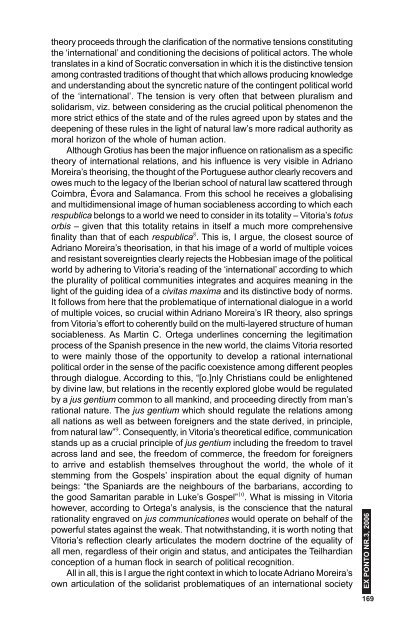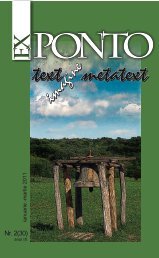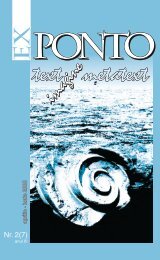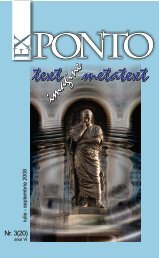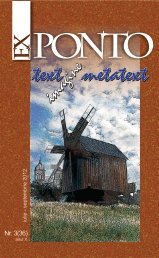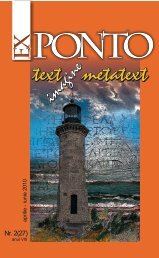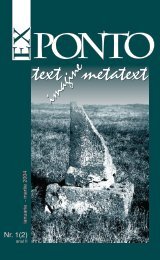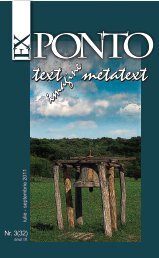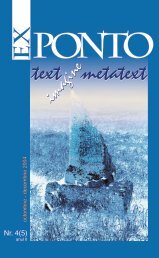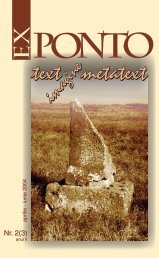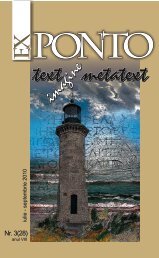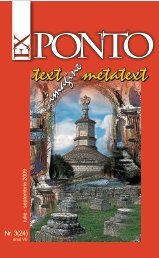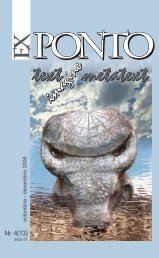Nr. 3 (12) anul IV / iulie-septembrie 2006 - ROMDIDAC
Nr. 3 (12) anul IV / iulie-septembrie 2006 - ROMDIDAC
Nr. 3 (12) anul IV / iulie-septembrie 2006 - ROMDIDAC
- No tags were found...
Create successful ePaper yourself
Turn your PDF publications into a flip-book with our unique Google optimized e-Paper software.
theory proceeds through the clarification of the normative tensions constitutingthe ‘international’ and conditioning the decisions of political actors. The wholetranslates in a kind of Socratic conversation in which it is the distinctive tensionamong contrasted traditions of thought that which allows producing knowledgeand understanding about the syncretic nature of the contingent political worldof the ‘international’. The tension is very often that between pluralism andsolidarism, viz. between considering as the crucial political phenomenon themore strict ethics of the state and of the rules agreed upon by states and thedeepening of these rules in the light of natural law’s more radical authority asmoral horizon of the whole of human action.Although Grotius has been the major influence on rationalism as a specifictheory of international relations, and his influence is very visible in AdrianoMoreira’s theorising, the thought of the Portuguese author clearly recovers andowes much to the legacy of the Iberian school of natural law scattered throughCoimbra, Évora and Salamanca. From this school he receives a globalisingand multidimensional image of human sociableness according to which eachrespublica belongs to a world we need to consider in its totality – Vitoria’s totusorbis – given that this totality retains in itself a much more comprehensivefinality than that of each respublica 8 . This is, I argue, the closest source ofAdriano Moreira’s theorisation, in that his image of a world of multiple voicesand resistant sovereignties clearly rejects the Hobbesian image of the politicalworld by adhering to Vitoria’s reading of the ‘international’ according to whichthe plurality of political communities integrates and acquires meaning in thelight of the guiding idea of a civitas maxima and its distinctive body of norms.It follows from here that the problematique of international dialogue in a worldof multiple voices, so crucial within Adriano Moreira’s IR theory, also springsfrom Vitoria’s effort to coherently build on the multi-layered structure of humansociableness. As Martin C. Ortega underlines concerning the legitimationprocess of the Spanish presence in the new world, the claims Vitoria resortedto were mainly those of the opportunity to develop a rational internationalpolitical order in the sense of the pacific coexistence among different peoplesthrough dialogue. According to this, “[o.]nly Christians could be enlightenedby divine law, but relations in the recently explored globe would be regulatedby a jus gentium common to all mankind, and proceeding directly from man’srational nature. The jus gentium which should regulate the relations amongall nations as well as between foreigners and the state derived, in principle,from natural law” 9 . Consequently, in Vitoria’s theoretical edifice, communicationstands up as a crucial principle of jus gentium including the freedom to travelacross land and see, the freedom of commerce, the freedom for foreignersto arrive and establish themselves throughout the world, the whole of itstemming from the Gospels’ inspiration about the equal dignity of humanbeings: “the Spaniards are the neighbours of the barbarians, according tothe good Samaritan parable in Luke’s Gospel” 10 . What is missing in Vitoriahowever, according to Ortega’s analysis, is the conscience that the naturalrationality engraved on jus communicationes would operate on behalf of thepowerful states against the weak. That notwithstanding, it is worth noting thatVitoria’s reflection clearly articulates the modern doctrine of the equality ofall men, regardless of their origin and status, and anticipates the Teilhardianconception of a human flock in search of political recognition.All in all, this is I argue the right context in which to locate Adriano Moreira’sown articulation of the solidarist problematiques of an international societyEx Ponto nr.3, <strong>2006</strong>169


